MercoPress. South Atlantic News Agency
Latin America
-
Tuesday, September 29th 2009 - 10:34 UTC
Bag of claims inflation: Falklands, Cuba plus Diego García and Mayotte
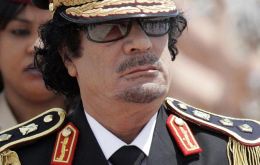
The recent second summit of South America and African leaders added to the traditional statements on the Falklands/Malvinas dispute and the US trade embargo on Cuba, similar demands referred to disputes over islands in the Indian Ocean involving Britain and France.
-
Tuesday, September 29th 2009 - 07:50 UTC
The party is over: Cubans are told to work harder and solve their problems
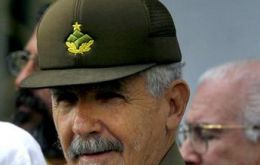
Cubans should no longer “expect the government to solve all of its problems” and “should work hard and efficiently to overcome the crisis and ensure the continuity of the revolution” said Communications Minister Ramiro Valdes quoted with extensive coverage in Havana’s Sunday media.
-
Tuesday, September 29th 2009 - 06:50 UTC
US describes Zelaya’s actions “irresponsible and foolish”
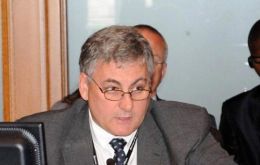
A top US diplomat says deposed Honduran President Manuel Zelaya was “irresponsible and foolish” to return before a settlement had been reached. Lewis Amselem, US ambassador to the Organization of American States (OAS), said Washington had asked Mr Zelaya not to return because of potential unrest. He called on him to urge his supporters to keep their protests peaceful.
-
Tuesday, September 29th 2009 - 06:20 UTC
Cristina Kirchner, the president with the lowest support in South America
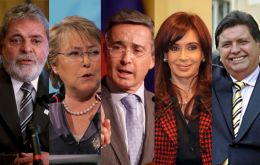
Presidents from El Salvador, Brazil, Chile, Panama and Colombia figure among the Latinamerican leaders with the highest ratings of support and Argentina’s Cristina Fernandez de Kirchner in the bottom short list with 23%, according to the respected Mexican pollster Mitofsky Consultants, MC.
-
Monday, September 28th 2009 - 07:58 UTC
Gaddafi proposed the creation of a South Atlantic military alliance
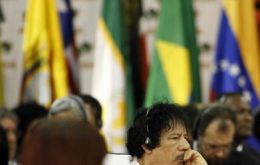
Libyan leader Muammar Gaddafi proposed a military alliance mirroring the North Atlantic Treaty Organization, to counteract the influence of the US and Europe during the second Africa-South America summit held over the weekend in Margarita island, Venezuela and which convened almost sixty leaders.
-
Monday, September 28th 2009 - 07:37 UTC
Brazil rejects “ultimatum” from Honduras de facto government
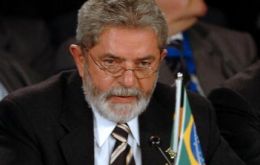
Brazilian President Lula da Silva said on Sunday his nation would not comply with a demand from Honduras' de facto government to decide the status of ousted President Manuel Zelaya in 10 days.
-
Sunday, September 27th 2009 - 18:31 UTC
South American leaders sign agreement creating South Bank
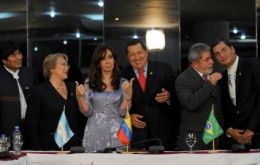
The presidents of Argentina, Brazil, Paraguay, Uruguay, Ecuador, Bolivia and Venezuela, signed on Saturday night an agreement establishing the South Bank with an initial capital of 20 billion U.S. dollars.
-
Saturday, September 26th 2009 - 12:31 UTC
Security Council calls on Honduras to stop harassing the Brazilian embassy
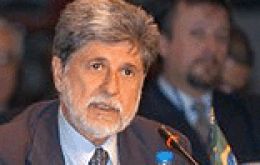
The United Nations Security Council held an emergency meeting on the situation in the Brazilian Embassy in Honduras, where ousted Honduran President Manuel Zelaya has been sheltering since Monday. The council condemned acts of intimidation and called on the de-facto Honduran authorities to stop harassing the embassy.
-
Saturday, September 26th 2009 - 06:45 UTC
US Congress report argues Zelaya’s ousting was “legal and constitutional”
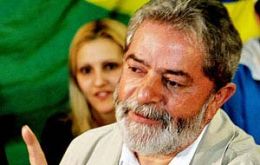
A report from the US Library of Congress legal branch released this week concluded that the ousting of elected Honduran president Manuel Zelaya was “legal and constitutional”.
-
Saturday, September 26th 2009 - 06:42 UTC
Itaipú agreement remains stalled; Lula da Silva blames Congress
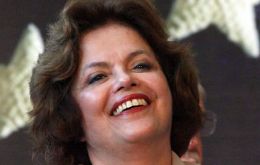
The coming electoral year makes it difficult for the Brazilian congress to approve in the short term the agreement reached with Paraguay referred to the surplus energy from the world’s largest operational hydroelectric dam Itaipú, signed last July by presidents Lula da Silva and Fernando Lugo.
